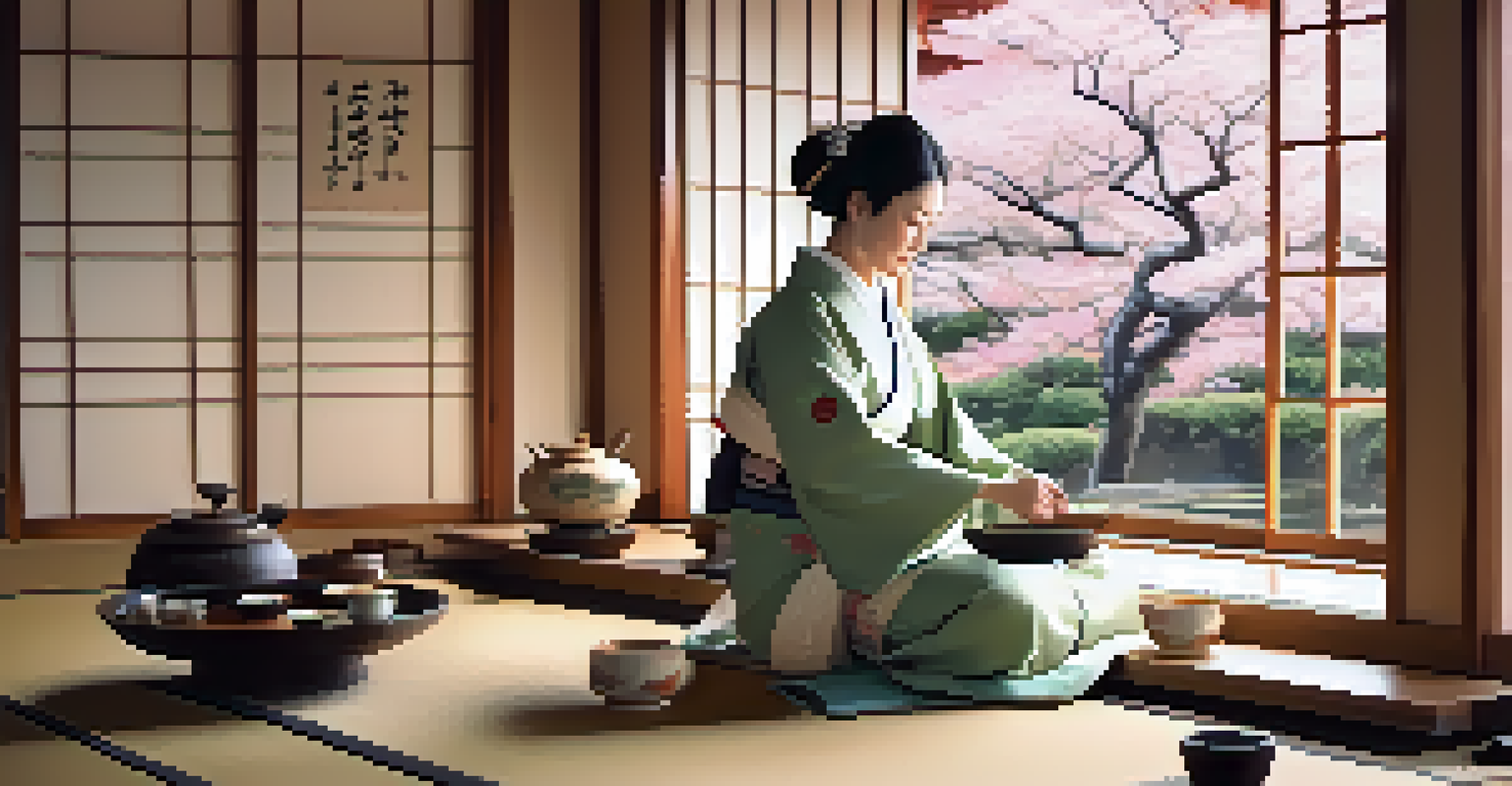The Impact of Rituals on Mental Health and Well-being

Understanding Rituals and Their Importance in Daily Life
Rituals are structured actions performed regularly, often infused with personal or cultural significance. They can range from simple daily habits, like morning coffee, to elaborate ceremonies, such as weddings. These repetitive actions provide a sense of order and predictability in our often chaotic lives, serving as anchors that ground us.
Rituals provide a sense of belonging, reminding us we are part of something larger.
In a world filled with uncertainty, rituals offer comfort and connection, both to ourselves and our communities. They create a sense of belonging, reminding us we are part of something larger. This connection can significantly enhance our emotional resilience, especially during challenging times.
Furthermore, rituals help mark important transitions in life, whether it's celebrating a milestone or mourning a loss. They allow us to process emotions and acknowledge experiences, making them vital for our mental well-being.
The Psychological Benefits of Rituals
Engaging in rituals can lead to enhanced mental health, providing a boost to our emotional state. Psychological studies suggest that these structured activities can reduce anxiety and stress levels. For example, a simple bedtime routine can signal to our brains that it's time to unwind, promoting better sleep and relaxation.

Additionally, rituals can foster a sense of control in our lives. When everything feels unpredictable, having something consistent to rely on can be incredibly reassuring. This sense of agency can combat feelings of helplessness, which are common during periods of stress or chaos.
Rituals Provide Stability and Comfort
Regular rituals help create a sense of order and predictability in our lives, offering comfort during uncertain times.
Moreover, rituals can enhance our coping mechanisms. Whether it's lighting a candle during meditation or practicing gratitude, these actions can create a mental space where we can reflect, recharge, and find clarity amidst turmoil.
Rituals in Different Cultures: A Global Perspective
Rituals vary widely across cultures, each with unique practices and meanings. For instance, the Japanese tea ceremony emphasizes mindfulness and respect, encouraging participants to slow down and appreciate the moment. Similarly, Indigenous rituals often revolve around nature, reinforcing a deep connection to the earth and community.
In times of stress, it is the small rituals of life that can provide the greatest comfort.
These cultural rituals not only enhance individual well-being but also strengthen social bonds. They create opportunities for shared experiences, allowing people to connect on a deeper level. In many cultures, communal rituals foster a sense of belonging and identity, which are crucial for mental health.
By understanding and appreciating diverse rituals, we can learn valuable coping strategies. Adopting aspects of different traditions can enrich our own lives, providing new perspectives on resilience and community support.
The Role of Personal Rituals in Everyday Life
Personal rituals are tailored practices that can be incorporated into daily routines, enhancing our mental well-being. Examples include journaling, daily exercise, or even a specific way of preparing a meal. These rituals provide structure and can help manage emotions, especially during stressful periods.
Creating personal rituals allows individuals to cultivate mindfulness, as they often require focus and intention. For instance, practicing a breathing exercise each morning can set a positive tone for the day ahead. This intentionality can lead to increased awareness of our thoughts and feelings, promoting emotional regulation.
Cultural Rituals Strengthen Bonds
Engaging in rituals from diverse cultures fosters community connections and enhances individual well-being.
Additionally, these rituals can serve as reminders of our values and goals. By intentionally engaging in meaningful practices, we reinforce our commitment to self-care and personal growth, which is essential for maintaining mental health.
Rituals as a Tool for Stress Management
Incorporating rituals into stress management strategies can be incredibly effective. Simple actions, like taking a few moments to stretch or enjoy a cup of tea, can provide a necessary pause in our busy lives. These small acts can help shift our focus and alleviate feelings of overwhelm.
Rituals can also serve as a signal to our bodies and minds that it's time to relax. Engaging in calming activities, such as reading or meditating, can create a sanctuary from daily stressors. This intentional separation can allow us to recharge and approach challenges with a clearer mindset.
Furthermore, the repetitive nature of rituals can be soothing. The predictability of performing a ritual can act as a calming mechanism, helping to soothe anxious thoughts and create a sense of stability amidst chaos.
Building Community Through Shared Rituals
Shared rituals, whether in families, friendships, or communities, play an essential role in strengthening connections. Activities like holiday traditions or weekly game nights create opportunities for bonding and shared joy. These rituals remind us of our shared experiences and the importance of togetherness.
Participating in communal rituals can also foster a sense of support and understanding. When individuals come together for a shared purpose, it can create an environment where everyone feels valued and included. This sense of belonging is vital for mental health, especially during challenging times.
Personal Rituals Enhance Mental Health
Incorporating tailored personal rituals into daily routines promotes mindfulness and emotional regulation.
Moreover, shared rituals can create lasting memories, reinforcing the bonds between participants. The joy and laughter experienced during these moments can serve as a buffer against stress and anxiety, contributing positively to overall well-being.
Incorporating Rituals into Your Life for Better Well-being
If you're looking to enhance your mental health, consider incorporating rituals into your daily routine. Start small by identifying activities that bring you joy or peace, whether it's morning meditation or a weekly walk in nature. Consistency is key, as rituals are most effective when practiced regularly.
You can also explore existing rituals from different cultures or traditions, adapting them to fit your lifestyle. For example, you might find inspiration in a gratitude practice from another culture, allowing you to cultivate a sense of appreciation in your own life. This blend of personal and cultural rituals can enrich your emotional landscape.

Finally, remember that rituals are highly personal and can evolve over time. Don't be afraid to experiment and find what resonates with you. The journey of discovering and establishing rituals can be an empowering process, ultimately leading to improved mental health and well-being.